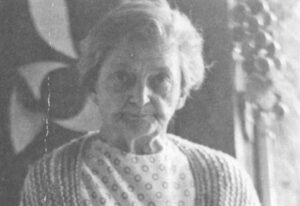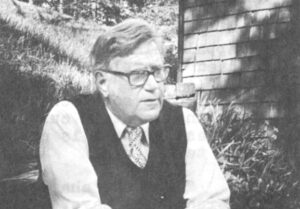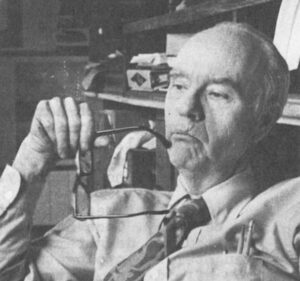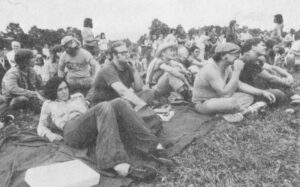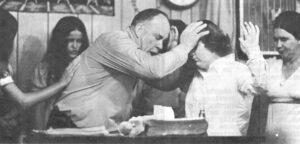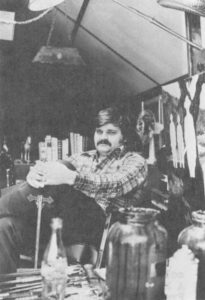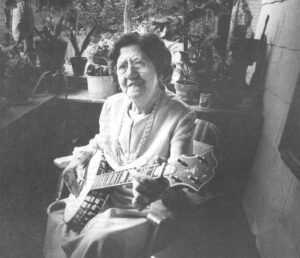The road to The Knob really isn’t a road at all.
It’s a path, a winding scar in a West Virginia mountain. Boulders as big as horses litter the roadbed. Here and there, mountain springs pour water on the clay base making mud pits that defy even rugged vehicles.
When Marrowbone Creek is high, travel comes to a halt since part of the road is a rocky creek bed. It is a two-mile trip from the valley floor to The Knob, but it can require as much as an hour’s driving time, depending on weather conditions.
It’s an unlikely place to find an 84-year-old philosopher, two native Californians and an escapee from the concrete canyons of New Jersey. But the dreams that are dreamed on that Mingo County Mountain seem to many to be as farfetched as the people who live there.
The four people whose paths have crossed on The Knob are building an extrapolation of the old Appalachian culture. They are choosing the best of the old ways as building blocks for a society based on independence, self-sufficiency and peaceful co-habitation with delicate Appalachian eco-systems.
The four are motivating forces behind a monthly newsletter — The Mountain Call — which extols the old virtues and attempts to make them relevant to today’s world.
Most of the philosophy in The Mountain Call, however, is primarily that of an 84-year-old woman known as “Ed.”
Her name is Edwina S. Pepper and since 1945, she has called Marrowbone Creek her home. She is a very private person, dispensing biographical information only when she thinks it will amplify a point she is trying to make.
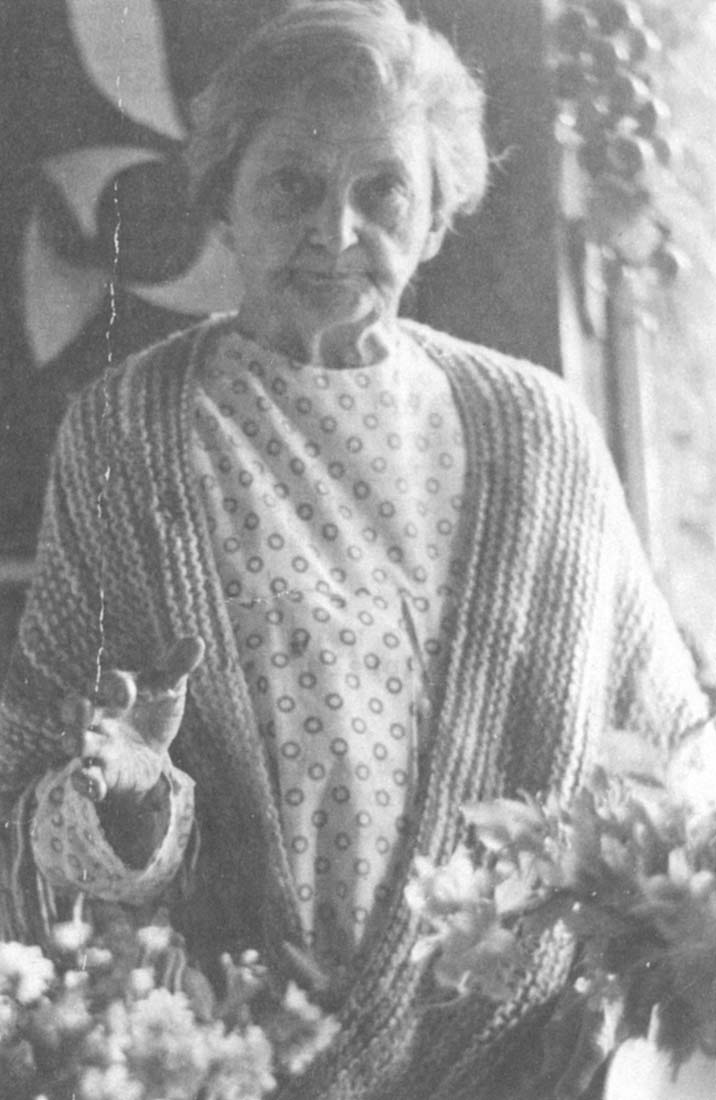
Mrs. Pepper, the daughter of a prominent and brilliant West Virginia attorney, was educated by tutors and nuns in the days before World War I. She was part of a glittering society where land and mineral barons built unimaginable fortunes on Appalachia’s natural wealth.
She was not reared in the traditional manner of the mountains, yet her sole aim today is to build a new Appalachian society based on these old ideals.
She talks of elaborate parties once held in the mansions of Huntington, W. Va., the hometown for scores of wealthy land dealers. But she has given all that up for the sake of traditional mountain living.
She remembers Huntington’s old society as a “gaudy” little island in the midst of Appalachia.
“To know what it was like in those days, one only need read (F. Scott) Fitzgerald,” she says.
Mrs. Pepper spent her young life in Williamson, only a few miles from where she lives today. Her father, the late John A. Shepherd, represented the Hatfield clan of the famous Hatfield-McCoy feud.
“My father was a farm boy from Virginia,” she says. “He likes to tell about the first time he came to Mingo County and the Hatfields asked him to take a case. He went to the Hatfield place and found them all shooting at a target. They put a gun in his hand. He hit the target luckily. That’s why he got the job with the Hatfields.”
Later, Mrs. Pepper’s father began representing coal company interests and, in time, purchased coal property himself. He did not send her to public schools with the children of coal miners. Instead, he employed a series of tutors to instruct his daughter until she was 14.
Williamson, W. Va., in those days was a boomtown. The Norfolk and Western Railway had just built new tracks along the Big Sandy River and coal seams of incredible richness were being mined to feed the fires of the industrial revolutions. Mrs. Pepper says the town was colorful beyond belief. “There was always something going on. People with guitars and banjos, singing and playing in the streets. Fights and even murders. But that’s all gone now. One town is just like another today. All the coal-mining towns are the same. They all seem so plucked.”
But even Williamson had its own social order. Mrs. Pepper says she remembers how, during the summers, she was expected to don white dresses and gloves for tea parties given by various wealthy families living there.
“Now wasn’t that a ridiculous thing to do in Williamson?” she asks rhetorically.
At the age of 14, she was sent to Cincinnati, Ohio, where her education continued at a Catholic school. While in Cincinnati, her father moved to Huntington where he built a mansion (she calls it “that big white thing”) on a hill overlooking the city.
Life in Huntington during the second decade of the 20th Century was one long round of social affairs, she says. The entire third floor of her father’s mansion was a ballroom, as was the custom in those days of Huntington’s early aristocracy.
“You wouldn’t believe the furnishings in some of those homes,” she says. “Huge chandeliers, ornate statuaries. It seems everyone was trying to out-gaudy everyone else.”
In those days, Huntington was on the edge of the Appalachian coalfields. The coal barons built their homes in Huntington apparently because of the rail and water link available in the Ohio River city, the relative closeness to the mines and the wide river valley that offered an ease and graciousness of living not possible in the steep mountains where coal was found.
While living In Huntington, just prior to the outbreak of World War I, Mrs. Pepper married. Her husband was a mining engineer who built coal tipples for the mines that were springing up all over West Virginia and Eastern Kentucky.
She says little about her life with her husband. In fact, she tends to skip over most of the period between 1917 and 1945.
She mentions that she lived in Mexico, Nevada and New York City for brief periods. When asked why she made the move to Marrowbone Creek, she replied, “I had two sons, one in the Pacific and one in the Atlantic, during World War II. I felt like something drastic had to be done. You get to a certain age and these wars mean something else to you than when you were young. I just wanted to get out of everything. There was a little piece of property I knew we had up here in the head of the creek. I came back and fell in love with the people.”
She recalls vividly that first visit to Marrowbone Creek.
“It was May and the laurel was in bloom. There were millions of tiny blue butterflies. As we were walking up the creek, an old man stopped us. He knew my father. He invited us into the house for dinner. His wife served us a meal and kept the flies off us while we ate. I remember the butter she served. It looked like whipped cream. Finally she served us coffee. She asked in her native dialect ‘Do you want your coffee cream-ed?’”
It was this nearly pure Elizabethan dialect that caused Mrs. Pepper’s heart to melt. She knew she was someplace special, someplace out of step with the rest of the world, its wars, its machines and its postwar booms.
“I knew I’d always live here after that visit,” she says.
She gave up the world she knew, but she didn’t drop out. She began thinking of ways to preserve what she had discovered in the mountains. She read all she could about Appalachia, its geography, its eco-systems, its pre-history, its Pioneer history.
Her first home was at the base of the mountains. She felt life there was too confining, however, so she built a house on The Knob, miles from the nearest neighbor.
She learned to live with the people in the hollow, rather than try to reform them. Although they seemed impoverished by middle class standards, Mrs. Pepper understood the reasons why they lived as they did. It was a matter of choice, she concluded.
It was not long until Mrs. Pepper became the mother of a second family, which included her two great nephews — John and Michael Fanning. They were the children of a nephew who had experienced severe physical and mental problems.
The twins came to The Knob when they were 9. Other members of the family feared the two California natives would not receive adequate educational and social opportunities in their formative years.
“But you should have seen them,” Mrs. Pepper says. “They loved the mountains from the moment they arrived. They spent their days hiking, swimming in the creek and exploring their new home.”
Their education in the mountains began in a one-room school at the head of the hollow. Later it was abandoned by the school board and the twins were forced to go to a consolidated school several miles away. It was an event that has shaped their current thought about the mountain education system.
During their senior year in high school, at the insistence of relatives, John and Michael went to school in Pasadena, Calif. A relative who volunteered to drive them back across the country to their Mingo County home thought he would treat them to a view of the Grand Canyon.
“We weren’t impressed,” Michael says. “The mountains and canyons in the West are so bare, so impersonal, not like our mountains at all.”
The two graduated from Marshall University in Huntington and have since lived at The Knob, involving themselves deeply in the dream.
The nucleus of the dream is the John A. Shepherd Memorial Ecological Reservation for the Preservation of Forest, Wildlife and Human Values.
This 300-acre reservation owned by Mrs. Pepper, is left virtually undisturbed except for a garden and a few log cabins which house people who have decided to join the experiment. Mrs. Pepper has been the magnet who attracts several families from outside Appalachia. In fact, it is safe to say that today, even with the sparse population; more families live in the hollow than ever before.
Mrs. Pepper calls it a community, and sees it as the basis for an experiment in Appalachian-style living.
“It’s not a commune,” she says, “since we do not share a common religion or belief. And if one family happens to leave, it will not destroy the community.”
Mrs. Pepper and her two nephews have been working toward the time when they will receive government approval for a plan to transform the Marrowbone Creek Watershed Area into a protected area — protected primarily from the ravages of strip-mining which has caused much damage to nearby streams and mountains.
Mrs. Pepper and the Fannings are fiercely opposed to strip-mining. Their views on the matter are carried in The Mountain Call, the monthly newsletter published at The Knob under the direction of a New Jersey native, Greg Carannante.
A Marshall University journalism graduate, Carannante worked for a time in the public information department at an Eastern college after graduation. He met the Fannings while at Marshall and was taken with their dream.
Carannante has become one of the family members at The Knob. Since the first issue of The Mountain Call about two years ago, he has become aware of the problems facing Appalachia.
The Mountain Call features a “Mountaineer of the Month” in each issue. More often than not, the featured mountaineer is one who has not achieved fame outside his or her own community.
The mountaineer might be known for his ability to grow a productive vegetable garden. He might be known in the community for his ability to heal farm animals of diseases and wounds. All are mountain people, most of whom are living their lives in the old traditional manner.
Nearly every issue carries an article about the effects of strip-mining on mountain terrain and ecology. Editorial comments call for the total abolition of strip-mining in the mountains on the basis that total reclamation of the land is not possible on steep slopes.
Mrs. Pepper writes reams of copy for the newsletter but she doesn’t allow her name to be signed. Only recently, she has allowed her initials “ESP” to be added at the end of these thoughtful pieces.
“It occurs to us that our house has been taken over by swine whose hunger in the form of greed has really made a mess of things. But how much have each of us contributed to this mess? Let’s not allow that question to go unanswered,” she wrote in the first issue.
Under the leadership of Mrs. Pepper and the Fannings, the people at The Knob have begun a move to decentralize schools in Mingo County.
Consolidation of schools in Appalachia has left only a few one-room schools such as the one the Fannings attended at the head of Marrowbone Creek. The people at The Knob want to change all that.
Beginning this fall, a one-room school will be in operation at the head of the hollow again. Sponsored by the group at The Knob, it will be taught by sisters who have committed themselves to the project. The nuns are certified teachers, but to date the Marrowbone School has not been accepted by the Mingo County Board of Education. And it’s not likely that it will ever be.
The school will rely heavily on teaching cultural heritage and instilling pride in Appalachia.
“If the educational system is to be meaningful it must perform what it sets out to do and that is to influence children to learn willingly,” John Fanning wrote in a recent issue of The Mountain Call. “The effort must work, and if it doesn’t, there must be something wrong. Possibly a grave mistake on the part of county boards of education was the discontinuance of the mountain schools throughout many areas of Appalachia. The small class or school concept has worked elsewhere in similar social conditions, and if more money could be made available, the concept could be employed in places not so far removed from our hills and hollows where our dropout once had to wait for a crowded bus.”
To say that the group at The Knob has had an impact on West Virginia or Appalachia would be an overstatement. But important movements in the past have begun under similar circumstances.
The people at The Knob hold to the culture as if it were a touchstone, a goal to be attained. And there’s irony in it since the culture was nearly lost before anyone at The Knob began recovering it.
“Regress is our most important progress,” says Carannante when speaking of work at The Knob. But it isn’t regression exactly since no one wants to go back to the days when isolation, lack of educational opportunities and a depressing road system held members of the cultural family in a death-like grip. The people at The Knobs, like the original settlers in the mountains, chose their path. And they’re holding to it with a tenacity that defies explanation.
Received in New York on September 5, 1975
©1975 Dave Peyton
Dave Peyton is an Alicia Patterson Foundation award winner on leave from The Huntington Advertiser (West Virginia). This article may be published with credit to Mr. Peyton, The Huntington Advertiser, and the Alicia Patterson Foundation.

